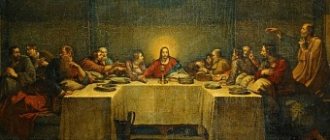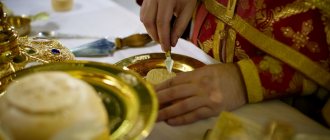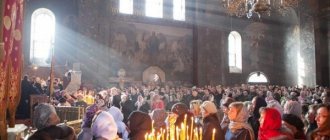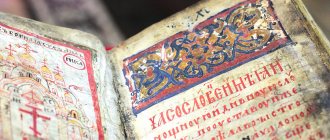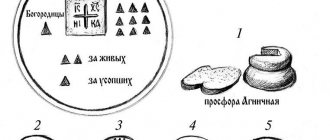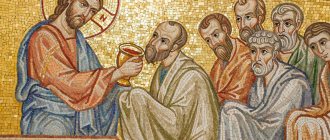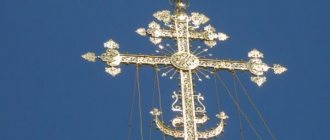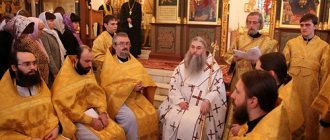Original lyrics and lyrics of the song In Your Kingdom:
In Your Kingdom, remember us, O Lord, when You come to Your Kingdom.
Blessed are the poor in spirit, for to them is the Kingdom of Heaven. Blessed are those who cry, for they will be comforted. Blessed are the meek, for they will inherit the earth. Blessed are those who hunger and thirst for righteousness, for they will be satisfied. Blesseds of mercy, for there will be mercy. Blessed are those who are pure in heart, for they will see God. Blessed are the peacemakers, for these shall be called sons of God. Blessed is the expulsion of truth for the sake of them, for those are the Kingdom of Heaven. Blessed are you when they revile you, and ridicule you, and say all sorts of evil things about you lying to Me for my sake. Rejoice and be glad, for your reward is many in heaven . In Russian:
In Your Kingdom, remember us, O Lord, when You come into Your Kingdom. Blessed are the poor in spirit, for theirs is the Kingdom of Heaven. Blessed are those who mourn, for they will be comforted. Blessed are the meek, for they will inherit the earth. Blessed are those who hunger and thirst for righteousness, for they will be satisfied. Blessed are the merciful, for they will receive mercy. Blessed are the pure in heart, for they will see God. Blessed are the peacemakers, for they will be called sons of God. Blessed are those who are persecuted for the sake of righteousness, for theirs is the Kingdom of Heaven. Blessed are you when they slander you and persecute you and slander you in every way unrighteously for My sake. Rejoice and be glad, for great is your reward in heaven.
“Remember me, Lord, in Your Kingdom!”
November 1, 2010, 03:29 A parishioner writes: About women When the apostles fled from Christ, weren’t it women who stood at the Cross?
Alexandra answers: A small correction from the Gospel. Not only women, but also John the Theologian. Do you know why? Among the Jews, women had a certain immunity: they were not touched. They were looking for the students: it was ordered to take all the students, so they fled. But John the Theologian was only 14 years old at the time of his execution; for the Jews he was a child who should also not be touched. Look how Christ arranged it: He called the 12-year-old boy John as his disciple. He knew that only he would remain at the Cross along with the Mother of the Lord, the Virgin Mary. He, while on the Cross, handed Her to his disciple John, saying: “This is your mother, this is your son.” And this was seen by the crucified thief suffering nearby on the cross, shouting at Jesus Christ: “What are you doing! Come down, as you promised, from the Cross and take us down.” But suddenly he heard the words of Christ addressed to his mother, looked down and recognized the Virgin Mary, and remembered how thirty-three years ago he was engaged in robbery on the road from Egypt, jumped out of the ditch towards the Saint The family (Jesus was 40 days old), wanting to snatch their belongings from them, and suddenly became blind from the bright light emanating from the Virgin and Child. He rolled on the ground in pain for a long time. Remembering this, he realized: God! And he said a phrase known to everyone, which opened the doors of Paradise to him, the first of people: “Remember me, Lord, in Your Kingdom!” The prudent thief Rach is one of the two thieves crucified with Christ, who repented before Jesus. The first person to go to heaven. The icon depicts a robber with a cross on his shoulder among paradise plants. The Cross of the Prudent Robber, according to the traditional version, was installed by Empress Helena on the island of Cyprus in 327. It contained a particle of the Life-Giving Cross and one of the nails with which the body of Christ was pierced. The Monk Daniel reports about this cross in his “Walk of Hegumen Daniel” (XII century) THE WORD SPEAKED IN THE PIMENOV CHURCH OF MOSCOW ABOUT THE PRECIOUS BIGGER. BEFORE DEATH. In order for the repentance that we bring before the face of our Lord Savior to be effective, the Holy Church often, throughout the entire church year, brings to our memory living examples of repentant sinners. But more often than all sinners, we must remember the prudent thief who hung and died with the Lord Jesus Christ (see: Luke 23, 40-43). It was no coincidence, by the Providence of God, that this robber died next to the Lord the Savior. It pleased the Lord that, every time we remember the cross of Christ, we also remember that at the right hand of the crucified Lord hung the one who, in his dying moments, brought such repentance to the Lord, which opened the doors of the Kingdom of Heaven to him. This prudent thief - as the Holy Church called him - cried out to the Lord with a short prayer, but this short prayer contained everything that attracted the mercy of God: it granted him the grace of forgiveness, the grace of justification before the Lord, bliss in the Kingdom of Heaven. What could be more touching than this image of a prudent thief in the face of the Lord and more touching than the image of the Savior Himself, Who opens his heart to a repentant sigh: “... remember me. Lord, when will You come into Your Kingdom,” and the answer in words that would be pricelessly dear to each of the repentant sinners to hear: “You will be with Me in Paradise.” But let not those sinners think who, remembering the thief who repented in his last dying minutes, would like to put off their repentance in the hope that they too will be able to repent before the Lord for their sinful life, like this thief whose hands are on The cross was covered not only with their own blood flowing from the nail wounds, but also with the blood of the victims of his robbery. To do this, you need to have everything that was in the heart of this robber in the minutes before his death. Think, dear ones, with what faith this robber turned to the Lord who was dying on the cross. For a few minutes we will step away from the cross with the dying Savior. The Lord Savior walks the earth, carries out His earthly feat, surrounded by the chosen Apostles, among whom Peter is the most ardent. Here the Apostle Peter says to the Lord Jesus Christ: “...You are the Christ, the Son of the Living God” (Matthew 16:16). He professes faith in the Lord Jesus Christ as the Son of God. Here the Apostles on Mount Tabor see the glory of the transfiguration of their Lord. And the same Apostle Peter exclaims: “...Lord! It’s good for us to be here…” (Matthew 17:4). So the Lord asks His Apostles: “...wouldn’t you also like to leave?” - and again the same Apostle Peter exclaims: “...Lord! who should we go to? You have the words of eternal life” (John 6:67-68). This was the apostle Peter. And again we will become in our spirit at the foot of the cross of Christ. Where are you, Apostle Peter? You are not here. As the holy Evangelist says, “having left Him, all [the disciples] fled” (cf. Mark 14:50). And the Apostle Peter, due to his weakness, denied the Lord and said: “... I do not know this Man of whom you speak” (Mark 14:71). Oh, supreme Apostle Peter, of course, we do not remember this with a spirit of condemnation. No! We know that through your weakness you betrayed the Lord, for you have not yet been strengthened by the grace of the Holy Spirit. We know that you were the greatest preacher of the words of Christ and you died for Christ, head down, as a sign of your greatest reverence for the atoning death of the Savior and complete devotion to the Lord. And if we remember your weakness, standing in spirit at Golgotha, it is only to show what kind of faith this prudent thief had. He was not with the Lord Jesus Christ on Mount Tabor, he did not see the miracles of Christ, he did not hear those of His sermons that touched and shocked human hearts. He only heard about it from others. But when he hung next to him on the cross, when he saw the innocent condemnation, boundless patience and meekness of the One who was dying next to him, when he felt with all his heart that only one King of heaven and earth could die like that and pray for His crucifiers, when he saw in Him the Master of the Heavenly Kingdom, he exclaimed from the depths of his believing soul: “Remember me, Lord, when you come into Your Kingdom.” And in response to this, he heard dear words known to us. You and I, dear ones, know what this robber did not know, we know many times more than that. We see the power of God that the Lord has been demonstrating in His holy Church for almost 2000 years. We see the manifestation of God's Providence in each of us's own lives, with which the Lord many times saved us from all sorts of troubles and misfortunes, raised us up from our sick beds, consoled us, strengthened us. What kind of faith we should have during our repentance! And with all the strength of this faith, we must, opening our repentant heart to the Lord, confess: “I believe, Lord, and confess that You are truly... the Son of the Living God...” We must have faith in God such that there is no doubt. You must have faith in the Lord so strong that nothing can shake it, and with such faith you must go with a repentant heart to the Lord the Savior. Let everyone around you laugh at the Lord Jesus Christ, but you remain faithful to Him and strong in this faith, and bring this strength of your faith to His feet when you open your repentant heart. And you will hear with your heart, through the shepherd who gives permission for your sins, sweet words from the Lord Himself: “Son, your sins are forgiven you.” Continue to look upon the prudent thief. You see, he is aware of his sins. He is convicted of robbery; he realizes that he deservedly accepts this punishment, this grave suffering, dying on the cross. He is ready to confess his sins and says: “We have received what is worthy of our deeds,” he says, turning to his crucified unrepentant brother. He is ready to confess this sin in front of everyone. All around they blaspheme the Lord the Savior, spit on Him, the whole world is at enmity against Him with its malice. And he, this robber, who believed in the dying Lord and Savior in his dying minutes, enters eternity with his thoughts. He is afraid of only one thing, so as not to be alienated from the Lord in the Kingdom of Heaven, so as not to find himself outside the door of the Kingdom of Heaven. He does not think about his suffering, he does not ask the dying Savior, for Whom nothing is impossible, to deliver him from this suffering by the power of His omnipotence. No. In the consciousness of his sinfulness, he thinks about one thing: so as not to perish for the Kingdom of Heaven. And he was the first to enter heaven when the Lord Savior opened the doors of the Heavenly Kingdom. We know much more than this robber knew and understood. We know how guilty we are before the Lord for our sins, how we are criminals of God’s will. We know how we insult the holiness and greatness of God with our sins; what disobedient, wayward children of our Heavenly Father we are. He gives us many mercies and blessings, but we sinned yesterday, we sin today, and we will perhaps sin tomorrow if we do not someday stop on this path of sins and passions. We know that. And how do we confess our sins? With what feeling do we bring our repentant heart to the Lord? Do we condemn our sins, do we hate, do we turn away from sins? Do we feel disgust for those sins that were ready to destroy us if we did not repent of them and renounce them? Do we dread the thought of eternal alienation from the Lord? Are we ready to confess our sins not only in front of the shepherd, but, if the Lord would, in the face of all people, in front of everyone on earth, so that by confessing our sins, we may receive forgiveness from the Lord. If with such a consciousness of our sins and with such a feeling of repentance for sins we go to the Lord, we will also hear in our hearts the sweet words of the Savior: “Come to Me, all you who labor and are heavy laden, and I will give you rest...” (Matthew 11:28). Still continue to look at the robber. He's still alive. He's not dead yet. Listen to what he says. He turns to his brother who has not repented. His heart pities this brother who is dying. And he turns to him with the words: “Or are you not afraid of God?” Has your conscience not yet awakened? Aren't you afraid to die, knowing that you are going to eternal destruction? He cares about his brother. He can do nothing else: his hands are nailed, his feet are pierced with nails. If he had not been on the cross, he would have done a lot of good to people to atone for his sins. But he is already nailed down, he is already dying. And he only wanted to awaken the conscience of his dying brother with words. True repentance must always be accompanied by fruits worthy of repentance. We receive the joy of forgiveness. And we cannot hide this joy of forgiveness, when we receive it after tearful repentance. It makes its way out, I want to hug everyone, love, do good to people in order to atone for my many sins, so that they are erased forever from the book of our life. True repentance must always be accompanied by a change in one's sinful life. After such repentance, a person should become more humble, more loving, more merciful, more lenient towards people, and God has forgiven him, and he must forever forgive everyone whom he has so far forgiven poorly or not forgiven at all. And marvel at the mystery of the wisdom of God! This prudent thief remains to die on the cross. The Lord did not perform a miracle, did not give him life. The thief dies on the cross, for the Lord wants him to reach the limit of his suffering, so that he completely cleanses his soul from all the filth with which his robber soul was full, so that he enters the doors of the Kingdom of Heaven with a bright and pure soul. And if you see sinners crying before the face of the Lord and truly repenting before Him, you see them in sorrows and illnesses, remember that this is evidence that the Lord has forgiven them, for the Lord through these sorrows, through these illnesses, which He does not want to take away from a person, wants his soul to be cleansed and to become worthy of eternal joy in the Kingdom of Heaven. Now you see in the example of the prudent thief - is repentance easy? And how can we put it off, hoping that in the last minutes of our earthly life we can become like the prudent thief? Has any of us ever experienced the suffering of the cross and knows what this terrible suffering is? Can any of us be sure, can we know that he will die conscious, and not unconscious or in such powerlessness of body and soul, when the soul will no longer be able - with all its impulse towards God - to bring such repentance to the Lord as would it cleanse it and open the doors of the Kingdom of Heaven? Therefore, before it is too late, while we are alive, while we walk, while the holy temples of God open their doors to meet us, to receive us, to nourish us with Divine food, let us bring repentance to the Lord. Let repentance be the same as it would be if it were dying. And this will be repentance when a person does not want to justify himself in anything, when he only wants to blame himself for everything; when he wants to remember everything that has been sinful and bad throughout his life. Or maybe it will be the last one for some of us. The Lord alone knows when our earthly life will end. And our repentant heart will hear, in the recesses of our spirit, words of forgiveness from the Lord and the Lord’s promise to take to Himself into His eternal Kingdom that sinner who, with the tears of his repentance and the grace of repentance, managed to burn out all his sins. The Lord is generous and abundantly merciful to all who repent, to all who ask for His mercies, to all who seek His Divine consolation and His heavenly blessings. May the Lord give you and me such repentance (I will add: for violating the oath of 1613 - loyalty to the House of Romanov until the Last Judgment. Then the Lord will open the Doors of Paradise to all our people who lived under the Romanov dynasty, as was predicted.
EXPLANATION OF THE DIVINE LITURGY according to the rite of John Chrysostom (2 pages)
To you, Lord.
The priest proclaims in confirmation (to You, the source of strength, the giver of all blessings, to You, without Whom we can do nothing and from Whom we have received everything):
For all glory, honor and worship is due to You, Father and Son and Holy Spirit, now and ever, and unto ages of ages.
Then the singing of antiphons (anti-vocales) begins; these are verses taken from Psalms 102 and 145, which depict the various mercies of God towards us, which is why they are also called pictorial and are sung in 2 choirs alternately. The second antiphon is separated from the first by a small litany, ending with the exclamation of the priest:
For Yours is the dominion and Yours is the Kingdom, and the power, and the glory, of the Father and the Son and the Holy Spirit, now and ever, and unto ages of ages. Amen.
After this the song is sung:
The only begotten Son and the Word of God is immortal, and destined for our salvation to be incarnate from the Holy Theotokos and Ever-Virgin Mary, immutably made human
(Who for our salvation became man, without ceasing to be God),
crucified, O Christ God, having trampled down death by death
(Who was crucified and conquered death by His death),
One of the Holy Trinity, glorified to the Father and the Holy Spirit, save us.
(One of the Persons of the Holy Trinity, glorified along with the Father and the Holy Spirit).
After this there follows again a small litany, concluding with the exclamation:
For You are a good and loving God, and to You we send glory to the Father and the Son and the Holy Spirit, now and ever and unto ages of ages. Amen.
Not everyone who says to Me: Lord! God! will enter the Kingdom of Heaven, but he who does the will of My Father in Heaven
, says the Savior
(Matt. 7:21).
To remind us what this will of God is, without the fulfillment of which our prayer cannot be heard, then, like the 3rd antiphon, before the smallest entrance, we sing the commandments of the “beatitudes” spoken by the Lord on the mountain before the assembly of all the people, with the addition in each verse of the prayer of the thief on the cross:
In Your Kingdom, remember us, O Lord, when You come to Your Kingdom.
(Matt. 5:1-12. Luke 6:20-23, Luke 23:42).
1. Blessed are the poor in spirit, for to them is the Kingdom of Heaven.
Blessed are the humble, aware of all their sinfulness, their weakness to do good, all their unworthiness before God and who consider everyone better than themselves. Therefore, they expect God’s help and hope to be saved by God’s mercy. And to them, relying on the mercy of God, the Lord promises the Kingdom of Heaven, that kingdom about which the Lord said:
The Kingdom of God is within you
, and which, according to the Apostle Paul, is righteousness and peace and joy in the Holy Spirit
(Luke 17:31. Rom. 14:17).
2. Blessed are those who cry, for they will be comforted.
The greatest burden is sin, the greatest relief and happiness is the forgiveness of sins promised to those who lament.
Likewise, he will be comforted who, in grief, in trial, does not complain, but seeks relief in God: in Him he will find abundant consolation, above all that he expected.
3. Blessed are the meek, for they will inherit the earth.
These are those who do not get irritated themselves and do not irritate others; They do not grumble, but follow the example of the Savior, Who said: Take My yoke upon you and learn from Me: for I am meek and lowly in heart; and you will find rest for your souls.
(Matt. 11:29).
4. Blessed are those who hunger and thirst for righteousness, for they will be satisfied.
Those who seek spiritual satisfaction, spiritual food—the knowledge of God and justification by His mercy—will receive this in abundance. And just as bread strengthens bodily strength along with satisfying hunger, so the word of God with His grace in the sacraments gives inner peace to the pardoned sinner and strengthens his strength to fulfill the will of God.
If anyone is thirsty, come to Me and drink. Not like water, which quenches thirst only for a while, but whoever drinks of the water that I give him will never thirst.
(John 7:37 and 4:14).
5. Blessedness of mercy, for there will be mercy.
The merciful - in the name of love for God, selflessly ready to do every kindness to their neighbor.
So be merciful, as your Father is merciful
.
(Luke 6:36).
Feed the hungry, give drink to the thirsty, accept the strange, help the poor, console the unfortunate with good advice, a kind word, forgive every offense, in a word: take to heart every need of your neighbor, both mental and physical, as if it were your own.
And precisely because all this mercy (mercy) is a work of love, the merciful will themselves be pardoned, that is, all their sins will be covered by the mercy of God and they will be forgiven.
Her many sins are forgiven because she loved much
.
(Luke 7:47).
6. Blessed are those who are pure in heart, for they will see God.
According to the interpretation of Bishop Vissarion, to achieve purity of heart means to form your heart so that it ceases to be a source of not only sinful deeds, but also sinful thoughts, feelings and desires.
Sinful deeds are clear signs of spiritual impurity, but it can nest in us without being detected in them. People may not notice the impurity of sinful thoughts, feelings and desires, while it nests only in the heart, but God, the knower of the heart, sees it and condemns it with no less severity than the outer impurity of deeds.
(Prov. 15, av).
If your eye is pure, then your whole body will be bright
, says Christ.
(Matt. 6:22).
But woe to those who, drowning out their conscience, cover up their spiritual ulcers with self-delusion! Woe to those who call evil good and good evil, who consider darkness to be light and light to be darkness... Woe to those who are wise in their own eyes and reasonable in their own eyes.
The greatest happiness is promised to the pure in heart: they will see God!
7. Blessed are the peacemakers, for these shall be called the sons of God.
They themselves are at peace with God, with people, they strive to spread this peace around themselves, pacifying others following the example of God Himself, Who is peace and love; therefore, those who imitate Him, following in His footsteps, are called sons of God.
"My peace I give to you"
.
(John 14:27).
8. Blessed is the expulsion of truth for the sake of them, for the Kingdom of Heaven is theirs.
These are people who are ready to suffer for the truth, to sacrifice their benefits rather than sell their conscience, rather than betray their Teacher and Their God, who suffered for the truth on earth.
Truly I say to you, there is no one who has left house, or brothers, or sisters, or father, or mother, or wife, or children, or lands, for My sake and the Gospel, and will not receive... a hundred times more houses
and so on,
and in the age to come eternal life
.
(Mark 10:29,30).
In the Kingdom of Heaven, the little that we have deprived ourselves of here for the sake of the Lord will be replenished in abundance; and vice versa: if we take pity on the temporary and sell our soul out of man-pleasing, or because of some earthly gain, then the Lord will deny us on the great day of His Judgment before the angels of God.
(Matt. 10:32-33, Luke 12:9).
So, let us boldly and resolutely follow Him, remembering that in the eyes of God there is nothing large and small, like with people. Whoever deviates one hair's breadth from the truth has violated the law before God no less than the one whom people sentenced to prison for some crime that was obvious to them;
and whoever does not love his brother remains in death, and everyone who hates his brother is a murderer
.
(1 John 3:14-15).
It is impossible to serve God and the world, and between good and evil there is no middle way:
He who is not with Me is against Me
, says the Lord.
(Luke 11:23).
9. Blessed are you when people revile you and destroy you, and say all sorts of evil things about you lying to me for my sake; Rejoice and be glad, for your reward is abundant in heaven.
Fear not, little flock, who openly followed Him Whom the world did not recognize, Whom the leaders of the Jewish people slandered and condemned to death for the truth; Rejoice when you too suffer for His name from people who prefer darkness to light... Do not lose heart under the blows of their malice, for Christ suffered in the same way.
And then, just like Him, you will soon enter into the glory of God, and your reward will be great in heaven.
During the singing of the beatitudes, the Royal Doors open and the Small Entrance takes place.
When the 30th anniversary of the earthly life of the Lord I. Christ was completed, after baptism He went out to preach worldwide as the Enlightener of people; His bright image and the heavenly light of His wondrous teaching pierce the darkness of sin, and spread peace and consolation around them everywhere.
This time in the life of the Lord symbolically represents to us the Small Entrance, that is, the procession of the deacon with the Gospel in his hands, preceded by a lighted candle - and behind him the priest - from the northern doors of the altar to the Royal Doors. The candle resembles the one about whom it was said that
“he was a lamp, burning and shining”
- John the Baptist, who prepared people to receive the Messiah (John 5:35). May the Lord illuminate our hearts with His light of truth, the light of fearless faith and ardent love for Him.
